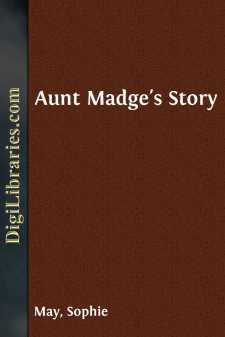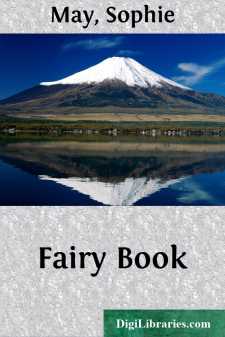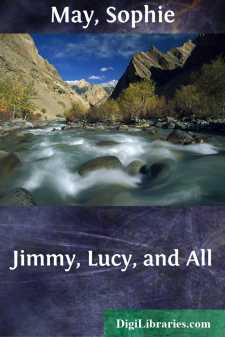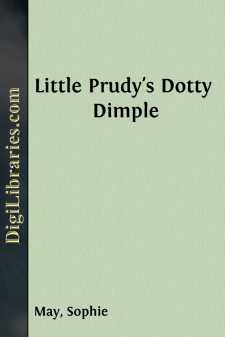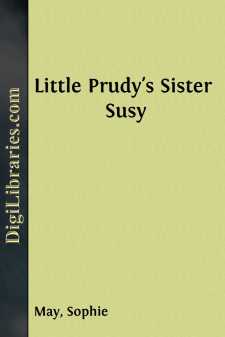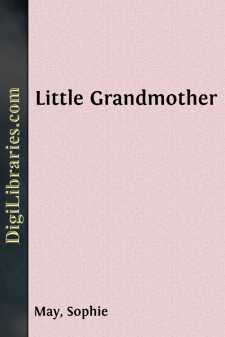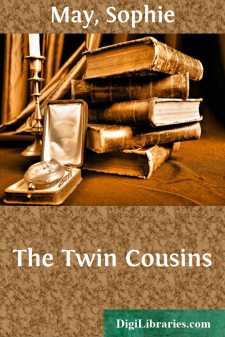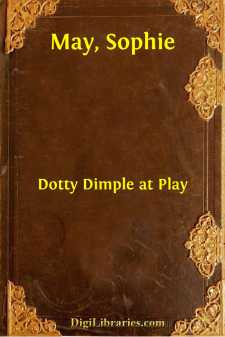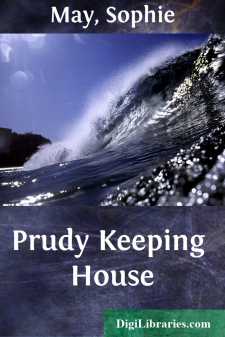Categories
- Antiques & Collectibles 13
- Architecture 36
- Art 48
- Bibles 22
- Biography & Autobiography 813
- Body, Mind & Spirit 142
- Business & Economics 28
- Children's Books 15
- Children's Fiction 12
- Computers 4
- Cooking 94
- Crafts & Hobbies 4
- Drama 346
- Education 46
- Family & Relationships 57
- Fiction 11828
- Games 19
- Gardening 17
- Health & Fitness 34
- History 1377
- House & Home 1
- Humor 147
- Juvenile Fiction 1873
- Juvenile Nonfiction 202
- Language Arts & Disciplines 88
- Law 16
- Literary Collections 686
- Literary Criticism 179
- Mathematics 13
- Medical 41
- Music 40
- Nature 179
- Non-Classifiable 1768
- Performing Arts 7
- Periodicals 1453
- Philosophy 64
- Photography 2
- Poetry 896
- Political Science 203
- Psychology 42
- Reference 154
- Religion 513
- Science 126
- Self-Help 84
- Social Science 81
- Sports & Recreation 34
- Study Aids 3
- Technology & Engineering 59
- Transportation 23
- Travel 463
- True Crime 29
Aunt Madge's Story
by: Sophie May
Categories:
Description:
Excerpt
CHAPTER I.
Here you sit, Horace, Prudy, Dotty, and Flyaway, all waiting for a story. How shall I begin? I cannot remember the events of my life in right order, so I shall have to tell them as they come into my mind. Let us see. To go back to the long, long summer, when I was a child:
There once lived and moved a little try-patience, called Margaret Parlin; no more nor less a personage than myself, your affectionate auntie, and very humble servant. I was as restless a baby as ever sat on a papa's knee and was trotted to "Boston." When I cried, my womanly sister 'Ria, seven years old, thought I was very silly; and my brother Ned, aged four, said, "Div her a pill; I would!"
He thought pills would cure naughtiness. If so, I ought to have swallowed some. Pity they didn't "div" me a whole box full before I began to creep; for I crept straight into mischief. Aunt Persis, a very proper woman, with glittering black eyes, was more shocked by me than words can tell. She said your grandma "spoiled me by baby-talk; it was very wrong to let little ones hear baby-talk. If she had had the care of me she would have taught me grammar from the cradle." No doubt of it; but unfortunately I had to grow up with my own father and mother, and ever so many other folks, who were not half as wise as Aunt Persis.
They called me Marg'et, Maggie, Marjie, Madge; and your grandpa's pet name was Totty-wax; only, if I joggled the floor when he shaved, it was full-length "Mar-ga-ret."
I was a sad little minx, so everybody kindly informed me, and so I fully believed. My motto in my little days seems to have been, "Speak twice before you think once;" and you will see what troubles it led me into. I never failed to "speak twice," but often forgot the thinking altogether. Margaret means Daisy; but if I was like any flower at all, I should say it was "the lady in the bower." You know it, Prudy, how it peeps out from a tangle of little tendrils? Just so I peeped out, and was dimly seen, through a wild, flying head of hair. Your grandma was ashamed of me, for if she cut off my hair I was taken for a boy, and if she let it grow, there was danger of my getting a squint in my eye. Sometimes I ran into the house very much grieved, and said,—
"O, mamma, I wasn't doin' noffin, only sitting top o' the gate, and a man said, 'Who's that funny little fellow?'—Please, mamma, won't you not cut my hair no more?"
I was only a wee bit of a Totty-wax when she stopped cutting my yellow hair, and braided it in two little tails behind. The other girls had braids as well as I; but, alas! mine were not straight like theirs; they quirled over at the end. I hated that curly kink; if it didn't go off it would bring my gray hairs with sorrow to the grave.
But, children, I fear some of the stories I told were crookeder than even my braids. In the first place, I didn't know any better. I told lies, to hear how funny they would sound. My imagination was large, and my common sense small. I lived in a little world of my own, and had very queer thoughts. Perhaps all children do; what think, Fly? When I was lying in the cradle I found my hands one day, and I shouldn't wonder if I thought they were two weeny babies come visiting; what do you suppose? Of course I didn't know they belonged to me, but I stared at them, and tried to talk. And from that time until I was a great girl, as much as five years old, I was always supposing things were "diffunt" from what they really were. I thought our andirons were made of gold, just like the stars, only the andirons had enough gold in them to sprinkle the whole sky, and leave a good slice to make a new sun. When I saw a rainbow, I asked if it was "a side-yalk for angels to yalk on?"
I thought the cat heard what I said when I talked to her, and if I picked a flower I kissed it, for "mebbe" the flower liked to be kissed.
I had a great deal of fun "making believe," all to myself. I made believe my mamma had said I might go somewhere, and off I would go, thinking, as I crept along by the fence, bent almost double for fear of being seen, "Prehaps she'll tie me to the bed-post for it."
And she always did.
I was the youngest of the family then, but I made believe I had once had a sister Marjie, no bigger than my doll, and a naughty woman in a green cloak came and carried her off in her pocket. I told my little friend Ruphelle so much about this other Marjie that she believed in her, and after a while I believed in her myself. We used to sit on the hay and talk about her, and wonder if the naughty woman would ever bring her back. We thought it would be nice to have her to play with.
This was not very wicked; it was only a fairy story. But the mischief was, my dear mother did not know where to draw the line between fairy stories and lies. Once I ran away, and Mrs. Gray told her she had seen me playing on the meeting-house steps with Ann Smiley.
"No, mamma," said I, catching my breath, "'twasn't me Mis' Gray saw; I know who 'twas. There's a little girl in this town looks jus' like me; has hair jus' the same; same kind o' dress; lives right under the meeting-house. Folks think it's me!"
Your grandma was distressed to have me look her straight in the face and tell such a lie; but the more she said, "Why, Margaret!" the deeper I went into particulars.
"Name's Jane Smif. Eats acorns; sleeps in a big hole. Didn't you never hear about her, mamma?"
As I spoke, I could almost see Jane Smif creeping slyly out of the big hole with mud on her apron. She was as real to me as some of the little girls I met on the street; not the little girls I played with, but those who "came from over the river."
My dear mother did not know what to do with a child that had such a habit of making up stories; but my father said,—
"Totty-wax doesn't know any better."
Mother sighed, and answered, "But Maria always knew better."
I knew there was "sumpin bad" about me, but thought it was like the black on a negro's face, that wouldn't wash off. The idea of trying to stop lying never entered my head. When mother took me out of the closet, and asked, "Would I be a better girl?" I generally said, "Yes um," very promptly, and cried behind my yellow hair; but that was only because I was touched by the trembling of her voice, and vaguely wished, for half a minute, that I hadn't made her so sorry; that was all.
But when I told that amazing story about Jane Smif, in addition to running away, mother whipped me for the first time in my life with a birch switch.
"Margaret," said she, "if you ever tell another wrong story, I shall whip you harder than this, you may depend upon it."
I was frightened into awful silence for a while, but soon forgot the threat. I was careful to avoid the name of Jane Smif, but I very soon went and told Ruphelle that my mamma had silk dresses, spangled with stars; "kep' 'em locked into a trunk; did her mamma have stars on her dresses?" Ruphelle looked as meek as a lamb, but her brother Gust snapped his fingers, and said,—
"O, what a whopper!"
That is why I remember it, for Ruth heard him, and asked what kind of a whopper I had been telling now, and reported it to mother.
Mother rose very sorrowfully from her chair, and bade me follow her into the attic. I went with fear and trembling, for she had that dreadful switch in her hand. Poor woman! She wished she had not promised to use it again, for she began to think it was all in vain. But she must not break her word; so she struck me across the wrists and ankles several times; not very hard, but hard enough to make me hop about and cry.
When she had finished she turned to go down stairs, but I said something so strange that she stopped short with surprise.
"I can't 'pend upon it, mamma," said I, looking out through my hair, with the tears all dried off. "You said you'd whip me harder, but you whipped me softer. I can't 'pend upon it, mamma. You've telled a lie yourse'f."
What could mother say? I have often heard her describe the scene with a droll smile. She gave me a few more tingles across the neck, to satisfy my ideas of justice; but that was the last time she used the switch for many a long day. Not that I stopped telling marvellous stories; but she thought she would wait till she saw some faint sign in me that I knew the "diffunce" between truth and falsehood.
CHAPTER II.
They say I grew very troublesome. Ruthie thought I was always "under foot," and nothing went on, from parlor to kitchen, from attic to cellar, but I knew all about it. There was not a pie, particularly a mince pie, that I didn't try to have a finger in.
But I could not have been in the house all the time, for Abner declares I was always out of doors. My little shoes were generally thick with mud, and my little frocks ready every night for the wash-tub. If there was a spoon or a knife missing, Abner often found it in the ploughed field, where I had been using it as a kind of pickaxe to dig my way through to China. No matter how muddy or slippery the walking, I begged to go out. I had a feeling that I wanted to skip like a lamb, fly like a bird, and dart like a squirrel, and of course needed all out doors to do it in.
"Don't fall down," cried mamma from the window; "look out for the ice."
And I answered back from under my red, quilted hood,—
"Well, if I do fall down and break me, mamma, you mus' pick up all my little bones and glue 'em togedder. God glued 'em in the firs' place, all but my tongue, and that's nailed in."
Not nailed in very tight: I could move it fast enough.
And when the snow and ice were gone, I liked to wade ankle-deep in the mud. Father had to buy me a pair of rubber boots, and that is the first present I remember. They filled my soul with joy. When I said my prayers I had one on each side of me, and when I slept it was with both boots on my pillow. At first I could think of nothing else to wish for; but one day I said,—
"I wish I was a pussy-cat, mamma, so I could have four yubber boots!"
Brother Ned and I were great friends. Partly to keep his eye on me, and partly because he enjoyed my conversation, he would say in the cool spring days, "Come, Maggie, dear, bring your cloak, and I'll wrap you up all so warm, so you can sit out on the woodpile while I chop my stint."
I think he must have been a little fellow to chop wood. After I got there, and was having a good time, he often remarked, in tones as cutting as the edge of his hatchet,—
"If I had a brother, Miss Maggie, I shouldn't take pains to wrap up a speck of a girl like you for company."
"Well, if had a little sister, I wouldn't be yapped up for comp'ny," retorted I, rubbing my small, red nose; "I'd be a-yockin' her cradle."
Ned laughed at that; for it was just what he expected me to say. We had one bond of sympathy; he longed for a little brother, and I longed for a little sister. He liked to hear me talk grandly about "my new baby-girlie, Rosy Posy Parlin. She wouldn't bl'ong to him any 'tall. She'd be mine clear through."
He led me on to snap out little sharp speeches, which he always laughed at; and I suspect that was one thing that made me so pert. I looked up to him as a superior being, except when I was angry with him, which was about half the time. I told Ruphelle Allen he was a "bad, naughty boy;" but when she said, "Yes, I think so, too," I instantly cried out, "Well, I guess he's gooder 'n your brother; so!"
Ruphelle was my bosom friend....


